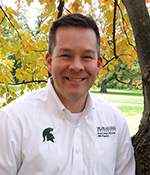How Veterans Can Make the Change to Higher Ed

Wayne Hutchison is the Managing Director of the Full-Time MBA Program at the Broad College of Business at Michigan State University. Before that, he served in U.S. Air Force from 1997-2018, earning the rank of Major.
In March 2020, when Michigan State University began closing down due to COVID-19, Wayne Hutchison remembered his military training, and systematically went door-to-door in his building to ensure students safely went home to await further instructions from the university on how classes would resume.
“My response to emergencies is still very much present,” Hutchison said. “It just doesn’t come out as much.”
When it came to a COVID response, there was a direct connection with Hutchison’s prior military service. But the transition to civilian life, and specifically a job in higher education, wasn’t always as smooth.
Here is how Hutchison was able to make the change from the military to higher ed:
Find a Rewarding Second Career
Hutchison’s father, Martin, served in the Air Force for 26 years, and Wayne knew by the time he was 8 he wanted to be a military officer. What he never thought about growing up was what an eventual transition to civilian life would look like.
Through significant self-reflection and the help of some amazing people, he was able to make a great transition to a second career in higher education.
Hutchison advises veterans who are the least bit curious about transitioning to higher ed to ask for help.
“Sometimes this can be challenging,” Hutchison said. “We are trained in many instances to really use the resources we have available for maximum effect and sometimes that people might think they shouldn’t or they can’t ask for help. I would encourage every veteran who is looking to transition or it’s just looking for a growth opportunity to ask for that support, and it will be there.”
He suggests finding someone who is doing the job that you might be interested in, and call or write to ask for 15 minutes of their time. Explain that you’re a veteran in transition and you’d like to talk to them about their experiences, and whether or not your skills would be a good fit. Hutchison has tried this many times and never had a bad experience.
“I have never been turned away,” Hutchison. “I find that folks are very willing to give help and support if asked. In many instances, veterans look at things outside our military service as vague or ambiguous, and sometimes it’s hard to really find that footing. One easy way to find that footing is just to connect to something you find interesting and just ask.”
Don’t Expect a Quick Transition
The process from deciding he was going to hang up his uniform to working in higher ed took Hutchison about 30 months. He started taking interviews in corporate America, did professional journey mapping, and talked to people at Michigan State, where he was an Air Force ROTC training instructor for his final four years of military service.
He had the same questions most veterans would have – how would his experience translate to a new setting? Would he need to learn new skills?
“I really remember that initial anxiety,” Hutchison said. “Okay, you’re going to give up this thing you’ve done your whole professional life, and for what exactly? I knew I wanted a personally meaningful second career but was not immediately sure of what that looked like. I think many veterans could feel that way.”
A crucial step was to plan early. Hutchison spent a year working on his resume, taking out acronyms that a civilian wouldn’t understand and removing information that was potentially confidential before it was ready to be sent out.
One key instrument of his journey was that he relied extensively on a career consultant to shape his resume and make the connections between military experience and civilian positions. He also took advantage of his spouse Jaimie, a professional career coach, who tailored his resume to his career goals and conducted mock interviews.
Check out Top Articles on HERC Jobs.
Download our free ebook, Veterans Transitioning Into Higher Ed (Revised Edition) for more information on your shift from military to civilian careers. Explore additional resources for veterans from HERC Jobs.
About the Author: Harold Gutmann is the director of brand and marketing strategy at Santa Clara University. He is a longtime writer and editor who is proud to work in higher education, and encourages all job seekers to consider it.

